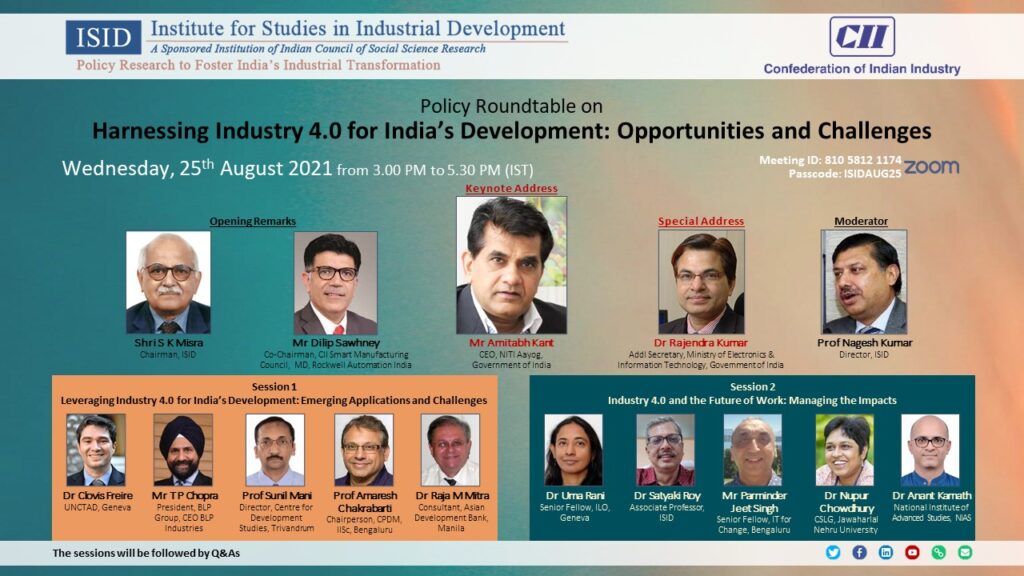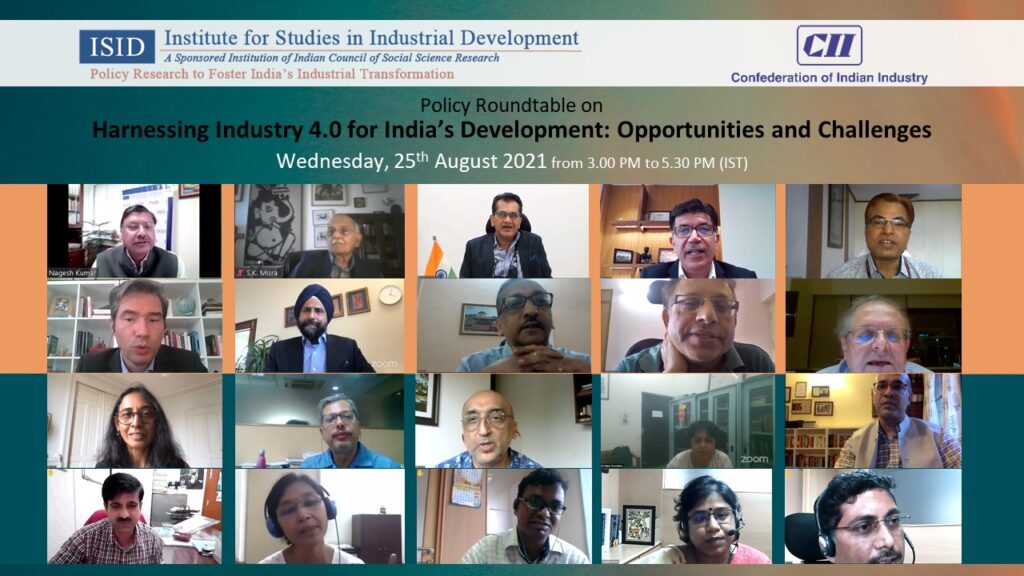
The advent of Industry 4.0 and the way industries and the economy in India is likely to be impacted was the main focus of the roundtable on “Harnessing Industry 4.0 for India’s Development: Opportunities and Challenges,” organised by the Institute in collaboration with the Confederation of Indian Industry (CII) on August 25, 2021. The workshop aimed to understand and discuss the various aspects of Industry 4.0 and their impact on industry, services, and society at large. The discussion was arranged basically on two sessions apart from the opening session which included opening remarks by Mr S K Misra, who briefly enunciated the contours of opportunities and challenges of new technology that the workshop would be deliberating on. Prof Nagesh Kumar moderated the two sessions of the workshop and highlighted the underlying insights that followed from each presentation to take it forward by the next speaker.
The CEO of NITI Aayog Mr Amitabh Kant primarily highlighted the importance of Industry 4.0 in enhancing competitiveness and efficiency by leapfrogging to higher orders of technology in the context of global competition. But this involves challenges of building adequate awareness among entrepreneurs, reskilling the workforce accordingly, and developing industry specific data in order to design specific policies. Mr Dilip Sawhney, Co-Chairman, CII Smart Manufacturing Council mentioned in the context of steel industries in India that new technology not only requires certain skills, but also flexibility of decentralised decision-making at the production line in responding to real time data feedback. Dr Rajendra Kumar, Additional Secretary, Ministry of Electronics and Information Technology, Government of India, highlighted the fact that a vast segment of Indian industries is operating at a technology level which is not even close to the technology paradigms of previous generations and they cannot overnight jump to new technologies. He highlighted the different initiatives designed by Ministry of Electronics and Information Technology to help tech-focused startups, which include digitisation of production and business transactions, manufacturing, and reskilling of the workforce. Mr Tejpreet Chopra, President & CEO, Bharat Light & Power Pvt Ltd discussed concrete examples how industrial internet of things is being used in automobile sector in maintaining energy efficiency, and for waste management in oil and gas pipelines; how the entire process of steel manufacturing is being digitised; and, solar power driven internet of things is being used for supply chain optimisation in railways and in other logistics. Prof Amaresh Chakrabarti, Professor & Chairman, Centre for Product Design & Manufacturing, Indian Institute of Science, explained the expanding cycle of manufacturing which involves production, processes, services, and business, and innovation which is required in all these phases.
The impact of new technology and the emerging concerns were highlighted by the panel that followed. Prof Sunil Mani, Director & Professor, Centre for Development Studies cautions that assessment of employment impact of new technology has to be based on task based data as robots are mostly used for tasks that require high precision and where occupational hazards use to be high. Dr Raja M Mitra, Consultant, Asian Development Bank, Manila argues that India is supposed to get advantages of demographic dividend that actually provides a window of using labour intensive technology which also creates demand in the economy and which is required for a technology leap. He said that government’s role in this regard should not only be confined to skilling, regulation and setting up of R&D centres but in fact should invest and enable producers to take advantage of new technologies. Dr Clovis Freire, United Nations Conference on Trade and Development, Geneva underlined that the market for Industry 4.0 technologies is estimated to be 350 billion dollar by 2025 but these technologies are also resulting in rising inequality within countries and a widening digital divide. Dr Uma Rani, Senior Fellow, International Labour Organisation discusses how digital labour emerges in services like taxi delivery. They use cloud computing and digital infrastructure, and are largely financed by venture capital. It radically alters the employment contract where assets are to be provided by the workers, and their performances are algorithmically managed and governed by ratings and reputations. Contrary to the claim of higher flexibility, these jobs involve longer hours of work and wide variation in earnings. Dr Satyaki Roy, Associate Professor, ISID argues that new technologies in the past didn’t result in massive unemployment as it could trigger growth in complementary sectors. It seems to be difficult this time because of slow diffusion of knowledge-intensive technologies in a market-driven economy as knowledge thrives more on collaboration and exchange rather than by transactions restricted by property rights. This also requires a distribution pattern that is much more cooperative and involves somewhat delinking of income from work through various forms of income transfer. Mr Parminder Jeet Singh, Senior Fellow, IT for Change focused on the radical break of the current technological revolution which involves disembodiment of intelligence and hence companies accumulate on the basis of control over human intelligence rather than having control on physical power embodied in machines. In that case, diffusion of technology entails a decision making process that should be closer to communities instead of being controlled by global tech companies. On the question of data privacy Dr Nupur Chowdhury, Assistant Professor, Centre for the Study of Law and Governance, Jawaharlal Nehru University highlights how potential reputation of an applicant or an employee is being judged on the basis of social media posts. This process of individual or community profiling not only infringe into right to privacy but also endangers the right to equality. Dr Anant Kamath, Assistant Professor, National Institute of Advanced Studies argues that permeation of technology is essentially embedded in social structures and power relations and technological inequalities often manifest in intangible differences in empowerment rather than in tangible differences in digital divides. Therefore, in place of imageries of device-centric virtual modernity, new technology uses need to be more inclusive such that gains can be translated to capabilities and functioning of the workforce.

Media coverage of the policy roundtable
- India well positioned to harness the potential of Industry 4.0, says Amitabh Kant(@amitabhk87) at the ISID-CII policy roundtable. (twitter.com)

